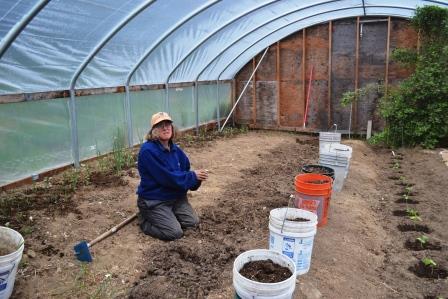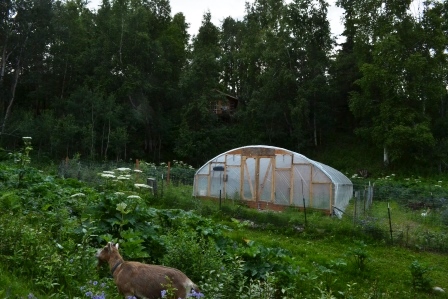
Home > Dispatches > Daily Dispatches 2017 >Daily Dispatch #238
August 30, 2017: Interlude: Living Off the Grid
Yesterday afternoon I was at the recycling sorting table, chatting with Chad, who is in charge of the Spanish honors program at Colony High School. I told him some about my life, where I live and what I do, in order to provide him with a rationale for my taking on the job of being an Alaska State Fair Recycling sorting area worker. After, I realized that I needed to provide those reading these dispatches with this information. Otherwise, they’d have the pieces of the puzzle but no board on which to lay the pieces. So what follows is in part what I am telling volunteers. Pete and I live off the grid, on a 2.5 acre parcel, located outside of Palmer. It’s been difficult, pulling myself away from the home front and heading on in to work because we have so much going on here. I spend my mornings writing and my afternoons working around the place we call Squalor Holler. Pete’s the gardener and I’m the livestock person. Pete’s a social animal, but I generally lead a fairly solitary life. It’s impossible to get a hold of me by cell phone. We have a landline phone. We share our property with four Icelandic horses, two chickens (again soon to be three in number), two goats (hopefully in |
|
| the future to be three in number ), and one dog (hopefully soon to be two in number – looking for another border collie). Our doe Stormy provides us with milk – we drink our own milk and eat our own cheese and yogurt. The words “living sustainably” is now an overused term, but this is what we are attempting to do. We have a root cellar in which we store produce. We have three gardens, a greenhouse, and an NRS funded hoop house. Pete also put in a fruit orchard this summer. We jar our raspberries, currants, and Saskatoons. Pete goes dipnetting for salmon in Chitina, and together we pick blueberries, which we also can and freeze. Compost happens here. We put the horse manure in buckets and encourage gardeners to take it. I used to turn the compost by hand, but agreed with Pete that we should invest in a tractor when the horses came of riding age. We sell some compost, but the majority goes into our gardens. We heat with wood, and in the summer solar and wind are our primary electrical sources. We have a back-up generator, which we use to pump water and augment the solar and wind to charge batteries in the winter. Because we live the way we do, both Pete and I are acutely aware of the importance of conserving resources. We have a number of marked bins and take our recyclables to VCRS. We also have a root cellar in which we store produce and goat milk. Our water tanks were originally from the Mat Maid dairy. Rain gutters, gotta have them, fill them. We water the horses and garden, via these tanks and a hose system. I used to bemoan the fact that we don’t have the supposed necessities on hand, some being a toaster, a microwave, a hair dryer, or a coffee maker. Nor do we have watering hose or a lawnmower. However, this has made me far more resourceful and hands-on than I used to be. I also have come to see the importance of livestock in our lives. I previously mentioned that our chickens and goats give us produce. In addition, the horses and goats are (respectively) our lawnmowers and landscape artists. The horses go for the grass and the goats go for the shrubs. And the chickens eat the slugs and occasional mice. As I told Chad, the hardest part of my job has been the temporary change in lifestyle from one in which I am alone most of the time to one in which I’m surrounded by people. But the change is well worth it. The job I’m now doing is related to my off-the-grid lifestyle IS related to the job I’m now doing. Encouraging others to consume less and more wisely is what is going to save this planet. That others (both young and old) are involved in this endeavor makes the time spent well worth it. |
|

